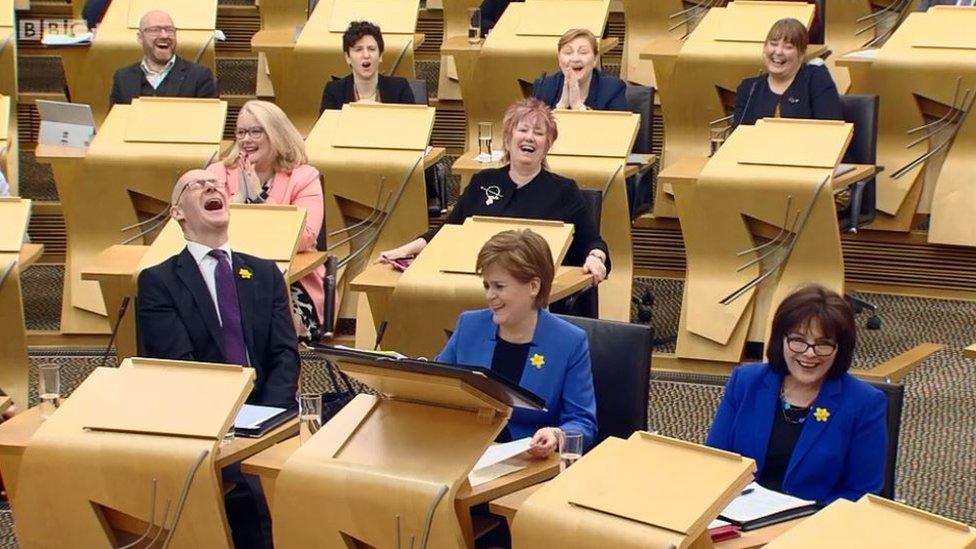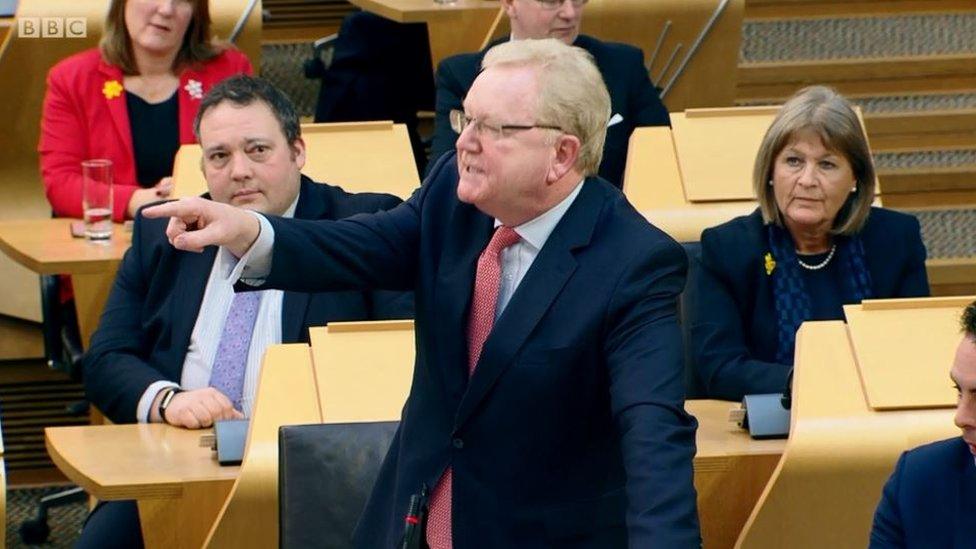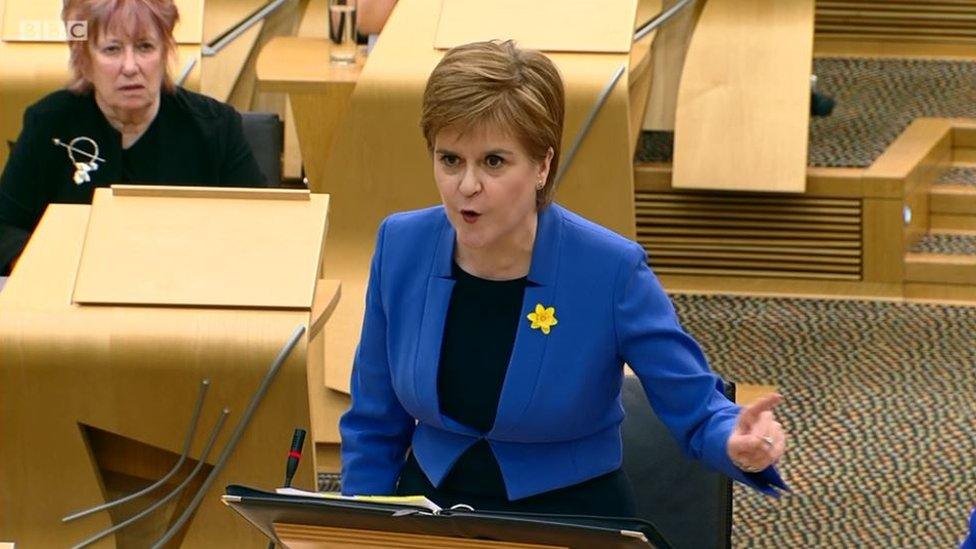Parliamentary pantomime
- Published

John Swinney particularly enjoyed Jackson Carlaw's efforts at FMQs
Does theatre have a place in politics? Ken Macintosh, Holyrood's presiding officer, thinks so - although he told me in an interview that he fears it can go too far.
The PO is concerned that emotional discourse can too readily give way to social media style abuse. And so he has urged MSPs to ca' canny, just a fraction. To heed his advice, in short.
Mr Macintosh carried his words into action during questions to the first minister today. Like a heckler at an opening night, he intervened to advise the first minister that she might usefully draw her remarks to a close.
Nicola Sturgeon looked discombobulated, like a shocked concert pianist offered unwarranted advice from a tutor. She carried on to complete her sonata.
Either way, there was theatricality aplenty on display today. Jackson Carlaw for the Conservatives rose magisterially (he does magisterial rather well, does Mr C).
Everyone knew, he averred, that Nicola Sturgeon was simply the temporary occupant of Bute House. In two short years, he added, Ruth Davidson (currently on maternity leave) would have usurped Ms Sturgeon's role as first minister.
As he said this, Mr Carlaw thrust a wavering, challenging digit in Ms Sturgeon's general direction, like the spirit of Banquo chez Macbeth.
Not sure what reaction he expected. But the SNP benches erupted in joyous laughter. John Swinney hooted uproariously, rocking back and forward in his seat.

Jackson Carlaw said his leader Ruth Davidson - currently on maternity leave - would soon take Ms Sturgeon's job
Ms Sturgeon began to join him - then seemed to think twice. Was it entirely de rigueur for the FM to guffaw in an absolutely raucous fashion?
So she dialled down the chortling - only to rise and suggest that the Conservative interim leader had plainly embarked on another theatrical genre. Pantomime.
And why these exchanges? Because the opposition leaders, Conservative and Labour, wanted to talk about independence. While the first minister wanted to talk, primarily, about Brexit. A disjuncture to rival Pinter.
Hence Ms Sturgeon attempted to turn the tables upon Mr Carlaw. She challenged him to urge the PM to rule out a no deal departure from the EU.
Somewhat primly but in line with constitutional purity, the Tory chief said that it was up to the SNP leader to answer questions, as the duly elected FM. For now. Pending a change of government. Cue SNP hooting.
As in all good drama, there was a sub plot. That was the question of who might sanction indyref2. Under the Scotland Act, the constitution is reserved to Westminster. For the 2014 referendum, the power to hold a plebiscite was transferred temporarily under Section 30 of the Act.
So what might happen this time around should Nicola Sturgeon request a rerun? The foreign secretary told us today, in Glasgow. The Prime Minister would "of course" say no.
To be clear, this is not remotely a surprise. The qualifying phrase "of course" is the clue. Rejection is established policy for the UK government and for the Tories. As recently as mid-January, Mr Carlaw said the answer to such a question remained: "No way."

Nicola Sturgeon was keen to turn the topic to Brexit
However, it is intriguing to have the position set out so succinctly by a senior UK Cabinet Minister. The SNP responded by accusing UK ministers of acting in an anti-democratic fashion.
Indeed, that was the approach taken by Ms Sturgeon herself in her exchanges with Mr Carlaw.
But, repeatedly, she tried to take the discourse back to Brexit. She said she was happy, as ever, to talk up independence - but she would prefer that, for now, the whole Holyrood chamber tried to talk the PM down from the prospect of a no deal Brexit.
Back to Brexit
When it was his turn, Labour's Richard Leonard essayed a theme which he hopes will permeate his party's conference, starting tomorrow in Dundee. This is that the austerity programme of the Tories would be more than matched by what he called "turbo-charged austerity" under independence.
Once again, Ms Sturgeon rebutted this charge - but reverted to Brexit. She urged Labour to back plans for a rerun EU referendum, without caveat.
To the Greens next and a contribution from Alison Johnstone, who is now co-leader at Holyrood with Patrick Harvie. For her first offering in this role, she chose a classic Green topic - car transport and the concomitant threat to our children. Ms Sturgeon offered a co-operative approach, where possible.
Which all leaves us where? Firstly, three weeks from the scheduled Brexit date - with the EU setting the UK government a deadline of Friday to come up with a legal codicil to mitigate the Northern Ireland backstop.
Secondly, with further debates and votes on Brexit in the Commons next week, hanging upon those EU negotiations.
Then, thirdly, with a pending statement from Ms Sturgeon on what she hopes for, next, in the story of independence.
When the UK government says no to a request for a further referendum, Ms Sturgeon and her SNP would take the opportunity to castigate their opponents - and to continue preparing for a possible future plebiscite.
The Tempest? All's Well that Ends Well? Much Ado about Nothing? Hey, as you like it.